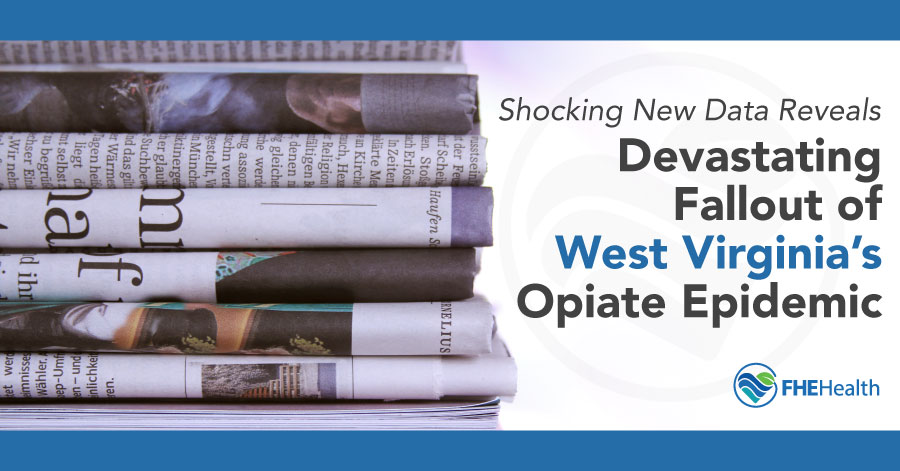
While drug arrests are down nationwide for the second consecutive year, the aftermath of the opiate epidemic in West Virginia continues to create ripple effects throughout the state.
According to a report from the Drug Enforcement Agency (DEA), there were 26,645 nationwide drug arrests in 2018, continuing a downward trend from 27,307 in 2017. From skyrocketing prison costs, to startlingly meager drug company opioid settlements, to the emerging menace of a methamphetamine crisis wreaking havoc statewide, the Mountain State just can’t seem to catch a break.
Prison Costs Due to Drug Epidemic in West Virginia
As if dealing with the continuing drug epidemic isn’t enough, representatives from the County Commissioner’s Association of West Virginia, speaking at their annual meeting in Canaan Valley, say they’re bearing staggering jail costs each year to house arrested and jailed inmates, according to Metro News.
For example, Lewis County’s annual jail bill paid to the Regional Jail Authority used to be $300,000 and is now upwards of $1 million, according to Agnes Queen, Lewis County commissioner. Greg Puckett, commissioner of Mercer County, said that a single month’s jail bill in the county is more than the amount spent annually on countywide economic development. And Dick Waybright, Jackson County commissioner, laments they could be doing so much more to benefit the community than spending so much money each year on the regional jail.
The state requires counties to pay per diem rates for each jailed inmate, whereas municipalities, where most of the arrests originate, don’t pay per diem rates. Commissioners would like to work something out, although the situation is far from equitable in the interim.
West Virginia Settles for Way Too Little with Drug Companies
Ravaged by the effects of the opiate epidemic, West Virginia isn’t seeing nearly enough from the settlements with drug companies agreed to and accepted by the state’s Attorney General Patrick Morrissey, says a view published in the West Virginia Record. The piece by Ken Hall, president of Teamsters Local 175 and general secretary of Teamsters International calls Morrissey’s settlements an embarrassment and a sellout, hinting that ties to Big Pharma may be a reason for the sweetheart deals.
The settlements come after a yearlong quest for access to seven years of data involving the opioid industry, from 2006 to 2012. That information, now made public, shows more than 76 billion opiate pills deluged the United States. In West Virginia during that period, 67 pills per person on a per capita basis were received annually, ultimately propelling the state to the highest per capita opioid death rate in America.
Settlements Morrissey agreed to thus far include $37 million with McKesson Corporation, the nation’s single largest opioid distributor, $20 million with Cardinal Health, and $16 million with Amerisource Bergen. Yet, the opioid epidemic costs West Virginia nearly $9 billion a year, according to estimates from the American Enterprise Institute. Deriding paltry drug settlement sums as an annoyance to highly profitable drug companies that won’t even dent the state’s annual bill to deal with this preventable public health crisis, Hall opines, “West Virginians deserve better.”
Meanwhile, a report in the Insurance Journal indicates that state lawmakers have asked the Attorney General for control of the $37 million McKesson opioid settlement, so it can be spent on opioid treatment programs— not administrative costs. A Morrissey spokesman says the office looks forward to working with the governor and legislature to get the settlement money to the state to “attack the drug epidemic holistically.”
Methamphetamine Also a Problem for Northern West Virginia
Methamphetamine, a highly addictive drug also known as meth, ice or crystal methamphetamine, is also a huge problem for the Northern District of West Virginia, according to WV News. Officials there say the deadly drug is more than 90 percent pure and made in secretive labs in other states. It is then shipped in or brought into the district from larger cities.
Combatting the methamphetamine crisis has prompted the state to seek federal and other aid. Even though methamphetamine distribution penalties are often harsher than those for opioid trafficking, meth is the drug of choice in the district. Indeed, about 90 percent of the drug seizures in Clarksburg is meth – and in large quantities. Drug task forces determinedly follow all the evidence to ferret out meth production sources and vow to “aggressively prosecute” anyone who’s responsible. Meth cases comprise the biggest percentage of all drug cases in the district, with about 45 percent of defendants facing meth charges.
While heroin, Suboxone® and other opioids create their own problems, methamphetamine in the district is uniquely challenging and more concerning due to the violence meth distribution creates. Lacking money to support their habit, meth users resort to robberies, burglaries and shoplifting, often involving guns. Confronted daily with psychotic behavior, members of law enforcement use their training to apprehend meth users, who tend to be dangerous, erratic and often violent.
Addiction Treatment Needs Must Be Addressed
Addiction to opioids, methamphetamine, prescription drugs and other substances of abuse doesn’t get better on its own. Professional treatment is the best approach to help those suffering the downward cycle of addiction begin their personal journey to recovery. While FHE Health is located in Florida, we welcome residents of any state and offer our services to anyone who’s looking to be free of an addiction.






